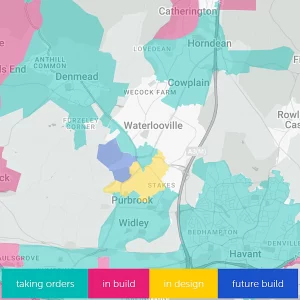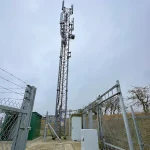Sponsored Links
Government to Confirm New Superfast Broadband Pilot Cash for UK Councils
Posted: 03rd May, 2011 By: MarkJ

 The government's Broadband Delivery UK (BDUK) office, which has been given a budget of £530m (rising to £830m by 2017) to help the country become "the best broadband network in Europe" and to deliver a minimum internet download speed of 2Mbps to all by 2015, is this week expected to start informing some local councils about whether or not their bids for public money have been a success.
The government's Broadband Delivery UK (BDUK) office, which has been given a budget of £530m (rising to £830m by 2017) to help the country become "the best broadband network in Europe" and to deliver a minimum internet download speed of 2Mbps to all by 2015, is this week expected to start informing some local councils about whether or not their bids for public money have been a success.The office's task is to help deploy "super-fast" broadband ISP connectivity services throughout most of the country by 2015. Its primary focus is to support remote and rural areas, where Private Sector investment will not go. This was outlined in more detail at the end of last year when the national broadband strategy - 'Britain's Superfast Broadband Future' - was first revealed.
So far only a handful of Next Generation Access (NGA) broadband pilots in the Highlands and Islands (Scotland), Cumbria, North Yorkshire and the Golden Valley, Herefordshire (England) have been revealed (here). However, despite being announced last October 2010 and with each being promised between £5m and £10m in funding, little practical progress has been made (here).
BDUK February 2011 Statement on First Pilots:
"BDUK is currently working with the pilot projects so that they are ready to start procurement. Each of the pilots is at a different stage of development, but we expect that the first of these will begin at the end of Q1 or start of Q2 this year."
"BDUK is currently working with the pilot projects so that they are ready to start procurement. Each of the pilots is at a different stage of development, but we expect that the first of these will begin at the end of Q1 or start of Q2 this year."
Since last year a significant number of Local and County Councils have been busy developing their bids for a slice of the governments cash, all of which are hoping to be included in BDUK's second batch of superfast broadband pilots. Funding of approximately £50m has apparently already been allocated for the second round, which leaves plenty of room for future announcements but also adds to the concern that BDUK might not be moving fast enough.
Furthermore several big ISPs have recently threatened to boycott the process (here) and announced plans to deliver a new superfast fibre optic broadband network, which could reach 5 Million homes in rural areas and act as a vital alternative to BT Openreach's national platform (here). However, their combined demand for £500m in government subsidy and cheaper access to BT's cable ducts still lacks substance and detail.
On top of that many smaller and extremely promising projects are now under threat because some local authorities have, perhaps understandably, chosen to put the brakes on any new infrastructure spending in the hopes of gaining a government handout. Sadly this Dithering and Delay can create market uncertainty and thus slows the pace of progress on projects that would have otherwise proceeded.
Officially the government will not reveal its next patch of superfast broadband pilots / projects until the end of this month, possibly on Friday 27th May 2011. However, as with the first round, some local authorities will reveal ahead of time whether or not their bids have been chosen. It's worth remembering that there should still be plenty of money left for those that don't quite make it into the second batch.
Search ISP News
Search ISP Listings
Search ISP Reviews
Latest UK ISP News








Cheap BIG ISPs for 100Mbps+
150,000+ Customers | View More ISPs
Cheapest ISPs for 100Mbps+
Modest Availability | View More ISPs
Latest UK ISP News
Helpful ISP Guides and Tips
Sponsored Links
The Top 15 Category Tags
- FTTP (6798)
- BT (3881)
- Politics (3074)
- Business (2766)
- Openreach (2663)
- Building Digital UK (2512)
- Mobile Broadband (2475)
- FTTC (2142)
- Statistics (2127)
- 4G (2092)
- Virgin Media (2024)
- Ofcom Regulation (1779)
- 5G (1732)
- Fibre Optic (1604)
- Wireless Internet (1595)
Sponsored
Copyright © 1999 to Present - ISPreview.co.uk - All Rights Reserved - Terms , Privacy and Cookie Policy , Links , Website Rules































